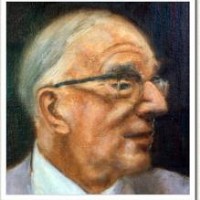Ungheria: orgoglio e identità, by Andrea Camaiora.
«C’è qualcuno che avrebbe preferito che non avessimo menzionato re Santo Stefano nel preambolo alla nostra nuova Costituzione. Ebbene, se non lo avessimo fatto avremmo negato le nostre radici, la nostra storia, in una parola la verità». È apparso convincente, determinato, carismatico il parlamentare europeo PPE József Szájer, in visita a Roma lunedì per un incontro con la stampa, al mattino presso la sede dell’ambasciata ungherese, e in serata con gli studenti della prestigigiosa John Cabot University.
Szájer, praticamente sconosciuto in Italia, non è un politico qualunque nel suo Paese. Ha presieduto la Commissione per la Redazione della Legge Fondamentale Ungherese ed è a lui che si deve il celebre e contestato preambolo che recita: «Noi, appartenenti alla nazione ungherese, all’inizio del nuovo millennio, provando senso di responsabilità per ogni nostro connazionale, proclamiamo: Siamo orgogliosi che il nostro re Santo Stefano [nella foto] abbia costruito lo Stato ungherese su un terreno solido e abbia reso il nostro paese una parte dell’Europa cristiana mille anni fa. Siamo orgogliosi dei nostri antenati che hanno combattuto per la sopravvivenza, la libertà e l’indipendenza del nostro paese. Siamo orgogliosi delle eccezionali conquiste intellettuali del popolo ungherese. Siamo orgogliosi che il nostro popolo nel corso dei secoli abbia difeso l’Europa in una serie di lotte e arricchito i valori europei comuni con il suo talento e diligenza. Riconosciamo il ruolo del cristianesimo nel preservare la nazione. Apprezziamo le varie tradizioni religiose del nostro paese. Ci impegniamo per preservare l’unità intellettuale e spirituale della nostra nazione lacerata nelle tempeste del secolo scorso. Le nazionalità che vivono con noi fanno parte della comunità ungherese politica e sono parti costitutive dello Stato».
L’europarlamentare di Fidesz (il partito di Viktor Orban) ha spiegato ai pochi giornalisti presenti in sala – tra i quali si notavano le clamorose assenze di la Repubblica, Corriere della Sera e Sky, testate tra le più ferocemente critiche nei confronti dell’attuale situazione politica ungherese – che gli ungheresi hanno assistito alle durissime critiche ricevute per la libera e sovrana scelta di dotarsi di una nuova Carta con una certa perplessità e ha spiegato il perché: nel 1222 re Andrea II d’Ungheria emanò la cosiddetta Bolla d’oro, ovvero un atto molto simile alla Magna Charta emanata in Inghilterra solo quattro anni prima, che impegnava il sovrano a rispettare certi limiti nella sua azione e che rappresenta pertanto la prima “Costituzione” dell’Europa continentale.
József Szájer ha avuto modo di ribadire che la scelta di dotarsi di una nuova Costituzione era molto sentita dagli ungheresi anche perché le istituzioni democratiche sviluppatesi man mano dal 1990 in poi, poggiavano sempre e comunque sull’ormai datato e discusso testo della Costituzione sovietica del 1949 «copiata sic et simpliciter dalla costituzione sovietica del 1936».
Szájer ha pure risposto alla giornalista di Radio Radicale Ada Pagliarulo che chiedeva le motivazioni che avevano portato a non iscrivere il rifiuto della pena di morte nella Carta del 2011 che gli ungheresi da vent’anni hanno definitivamente abolito la pena di morte aderendo anche a trattati internazionali che ne impediscono nuovamente l’adozione: «la nostra Costituzione – ha però ricordato l’europarlamentare magiaro – sancisce l’inviolabilità della persona, il primato della vita e altri principi di grande importanza».
Nel corso dell’incontro nella sede diplomatica magiara è emerso, sempre con riferimento alla tanto contestata nuova Carta, che la Commissione di Venezia del Consiglio d’Europa ha espressamente dichiarato di apprezzare «il fatto che questa nuova Costituzione stabilisce un ordine costituzionale basato sulla democrazia, lo stato di diritto e la protezione di diritti fondamentali quali principi basilari» (L’Opinione, 20 giugno 2011).
Read the complete article in La Bussola Quotidiana
Eric Voegelin: Prophet to the Modern Academy, by Robert Woods.
Eric Voegelin (1901– 1985) penned an essay entitled On Classical Studies (1973)–an essay that was shaped by the Classical west and the Christian faith and is philosophically opposed to the distortions of Enlightenment rationalism.
Reading Voegelin is akin to reading Amos or Joel. But instead of ancient Israel, it is the modern academy that is being rebuked. Here are just a few portions from his essay On Classical Studies to illustrate the significant problem that had occurred by 1973, “the fragmentation of science through specialization and the deculturation of Western society…specialized histories…institutional reduction…the life of reason; the end of ineluctable condition of personal and social order, has been destroyed.” In addition, Voegelin says, “the climate of our universities certainly is hostile to the life of reason…the fanatically accelerated destruction of the university since the Second World War…a pathological deformation of existence.”
This essay is a powerful indictment of the spirit of the age and the 1970s that had been a logical extension of the 1960s and earlier. But, all is not lost. There are always those who are in opposition to the new dark ages of the modern university. Voegelin paints a dark picture of higher education, but does not despair.
Read the complete article in The Imaginative Conservative
The Hook of Truth, by Gerard Kreijen
A review of Edmund Campion: A Life by Evelyn Waugh (Ignatius Press, 2005 [First published by Longmans, 1935])
That the undisputed master of dark humor and satire should have produced what is arguably the most compelling short biography of a saint to date is perhaps even more extraordinary than the claim that, today, both the biography and its author deserve close attention. Indeed, few means serve better to confront the hollow relativism of our age than turning to the conversion of Evelyn Waugh (1903-1966) and the life of Edmund Campion (1540-1581), the saintly subject of his 1935 book.
When Waugh was received into the Roman Catholic Church on September 29, 1930 his latest book had just been dubbed “the ultramodern novel”, so that his conversion caused sensation and bewilderment. In an article entitled, “Converted to Rome: Why It Has Happened to Me”, Waugh made it perfectly clear that his decision was not about ritual nor about submission to the view of others. The essential issue was the choice between Christianity and chaos.
Waugh had come to see Modernity as “the active negation of all that Western culture has stood for”. Civilization, he understood, “has not in itself the power of survival”. Christianity was the foundation of the West and without it the moral and aesthetic fabric of Europe would unravel. For Waugh this was a fact and the acknowledgment of this fact set him against modern society; it was his casus belli:
“The loss of faith in Christianity and the consequential lack of confidence in moral and social standards have become embodied in the ideal of a materialistic, mechanized state […] It is no longer possible […] to accept the benefits of civilization and at the same time deny the supernatural basis upon which it rests. “[1]
Thus Waugh turned “from ultramodern to ultramontane, and in doing so passed from fashion to anti-fashion”.[2] He became, as George Orwell quipped, “about as good a novelist as one can be while holding untenable opinions”.[3] In his literary attempts to represent man more fully, which for Waugh meant “only one thing, man in his relation to God”[4], he focused on the theme of the redemption of lost souls – notably, in his celebrated novel Brideshead Revisited (1945). Redemption, Waugh later explained with a reference to G.K. Chesterton, may be compared “to the fisherman’s line, which allows the fish the illusion of free play in the water and yet has him by the hook; in his own time the fisherman by a ‘twitch upon the thread’ draws the fish to land”.[5]
One gathers why Waugh wrote a life of Edmund Campion, the respected Oxford scholar who fled Elizabethan England amidst the troubles of the Reformation and who returned as a Jesuit priest to “crie alarme spiritual against the foul vice and proud ignorance, wherewith many my dear countrymen are abused”, finally to meet a martyr’s death at Tyburn.
Read complete article in The Clarion Review
Pensez-y toujours, n’en parlez jamais, by Chantal Delsol.
Chacun peut dire : je préfère ma civilisation aux autres. N’avons-nous pas le devoir de défendre ce que nous aimons ? Si nous ne défendons nos parents, notre culture, notre patrie, qui les défendra à notre place ? Mais cela ne signifie pas que ma civilisation serait supérieure en soi.
De même, je puis dire que je préfère mon père à tous les autres pères, sans pour autant prétendre qu’il est objectivement le meilleur… Et à cet égard, l’affirmation candide de supériorité de ce qui est à soi est le signe d’un caractère rustique, et pour tout dire, philistin, qui se croit au centre de la terre – classique chez un enfant, mais chez un adulte, risible.
Naturellement, on devine bien ce qui perce sous la phrase de Claude Guéant : si nous exportons la démocratie et la liberté sur la terre entière avec tant de ferveur, c’est bien que nous jugeons tout cela supérieur, alors cessons d’être hypocrites en défendant dans le même discours deux choses contradictoires : les droits de l’homme universels, et l’égale valeur de toutes les civilisations. Cependant l’argument est un peu court. On peut bien juger certains principes supérieurs à d’autres : le pluralisme à la caporalisation, la liberté à la servitude. Mais comparer ces mondes cohérents, pleins, complets, que sont les civilisations, c’est impossible. Toutes expriment un humanisme singulier et offrent un bonheur singulier. Il n’y a pas de civilisation diabolique, même s’il y a des épisodes monstrueux dans toutes les civilisations. Si de fait nous chérissons un universel, valable pour tous les hommes de la terre, nous devons bien nous garder de croire que nous incarnons cet universel : car le monde deviendrait alors notre terrain de chasse et d’incendie.
Il faut ajouter que le signe suprême de civilité consiste à ne pas étaler sa civilité – « pensez-y toujours, n’en parlez jamais ». Et seule une élémentaire modestie permet de convaincre d’autres d’adopter certains principes, mais jamais le triomphe, qui en humiliant se récuse lui-même. Se prétendre supérieur, c’est annoncer la « civilisade » (comme dirait Stuart Mill) et personne ne peut accepter cela, pour des raisons d’honneur bien compréhensibles.
Pour autant, la pluie d’injures qui vient de s’abattre sur l’affirmation du ministre ne mérite guère plus que le qualificatif de grotesque. La gauche sempiternelle, avec des airs inspirés laissant croire pour la énième fois que l’heure est grave, vient jeter de l’eau bénite sur le démon pour l’exorciser, et le jette hors du cercle des interlocuteurs vers les ténèbres extérieures d’où il n’aurait jamais dû sortir. C’est bien du vacarme, et ridicule, pour fustiger un discours qui n’était que lourdingue. Si enfin ce ne ressemblait qu’à une comédie idéologique bien française, on en rirait. Mais ce qui ne fait pas rire du tout, c’est cette propension répugnante à voir du nazisme partout. Contrairement à ce que l’on croit, nos cohortes de la sempiternelle gauche ne nuisent pas, ce faisant, au ministre, mais bien plutôt aux victimes du nazisme. Car si tout est nazisme, rien ne l’est, et pratiquement nous en sommes là. Il est misérable, pour servir un combat partisan d’un jour, de dévaloriser et de banaliser un combat de convictions de toujours. Si tout peut être comparé à la barbarie nazie, il n’y a plus de barbarie, et tout est dit. L’incroyable légèreté avec laquelle on envoie à la figure de son adversaire des symboles aussi lourds montre bien qu’il n’y a là ni convictions ni sérieux (en dépit des airs inspirés), mais plutôt une pantalonnade de plus, prête à détruire ce qu’il y a de plus grave.
On pourrait enfin souligner que les détracteurs du ministre, en avançant qu’il n’y a pas de civilisation supérieure, signifient qu’il n’y a pas de civilisation inférieure : il est donc étrange de voir les mêmes asséner à longueur de pages que la civilisation occidentale est à mettre au pilon pour son intrinsèque barbarie… On est bien obligé de se demander si ce qui les inspire dans cette querelle ce n’est pas, davantage que l’élémentaire modestie, plutôt la haine de soi.
Autrement dit, au-delà du ridicule de l’injure et même de son caractère dangereux, les détracteurs ont raison sur un point et tort sur un autre. Ils ont raison si l’on comprend que lorsque nous croyons incarner l’universel (c’est arrivé déjà à plusieurs reprises), nous terrorisons au nom de nos principes de liberté, ce qui est un comble : même si nous considérons qu’une civilisation nantie de la liberté est meilleure au-delà même de nos préférences filiales, mieux vaut donc ne pas en faire étalage, car cela pourrait donner des idées tyranniques à des missionnaires (laïcs) pas trop fins. Mais ils ont tort si l’on comprend que tous les principes se valent, et plus loin, que la seule hiérarchie serait finalement celle qui permet de tenir notre civilisation pour la plus pernicieuse de toutes.
Complete article at Valeurs Actuelles
HHS and Soft Totalitarianism, by George Weigel.
The Obama administration’s recently-announced HHS regulations, which would require Catholic institutions to subsidize health insurance coverage that provides sterilization, abortifacient drugs, and contraceptives, should be located within the context of the administration’s three-year long effort to define religious freedom down.
As the administration has demonstrated in its international human rights policy, it regards religious freedom as a kind of privacy right: the right to freedom of worship, which the administration seems to regard as analogous to any other optional, recreational activity. No serious student of religious freedom, however, takes the redefinition of religious freedom as freedom-to-worship seriously. For if that redefinition were true, there would be “religious freedom” in Saudi Arabia, so long as the “worship” in question were conducted behind closed doors. And that is manifestly absurd.
The HHS regulations announced on January 20 are one domestic expression of defining-religious-freedom-down. The administration does not propose to, say, restore the 1970 ICEL translations of the prayer-texts of the Mass; that, even HHS might concede, is a violation of religious freedom. But the administration did not think it a violation of religious freedom for its Equal Employment Opportunity Commission to try and overturn the longstanding legal understanding which held that religious institutions have a secure First Amendment right to choose their ministers by their own criteria—until it was told that it had gone way over the line in January’s Hosanna-Tabor Supreme Court decision (a judicial smackdown in which the administration’s own Court nominees joined).
Now, with the HHS “contraceptive mandate” (which, as noted above, is also a sterilization and abortifacent “mandate”), the administration claims that it is not violating the First Amendment by requiring Catholic institutions to provide “services” that the Catholic Church believes are objectively evil. That bizarre claim may well be another constitutional bridge too far. But the very fact that the administration issued these regulations, and that the White House press secretary blithely dismissed any First Amendment concerns when asked whether there were religious freedom issues involved here, tell us something very important, and very disturbing, about the cast of mind in the Executive Branch.
It is no exaggeration to describe that cast of mind as “soft totalitarianism”: an effort to eliminate the vital role in health care, education, and social service played by the institutions of civil society, unless those institutions become extensions of the state. As my colleague Yuval Levin has pointed out, it’s the same cast of mind that gave us Obamacare (which massively consolidates the health insurance industry into a small number of players who function like public utilities) and the Dodd-Frank financial sector reform (which tries to do to banks what Obamacare did to insurance).
The social doctrine of the Catholic Church emphasizes the importance of the mediating institutions of civil society in living freedom nobly and well. John Paul II coined the phrase “the subjectivity of society” to refer to these institutions, which include the family, religious communities, and voluntary organizations of all sorts. In Centesimus Annus, the late pope taught that, among their many other contributions to the common good, these institutions are crucial schools of freedom in which the tyrants that all of us are at age two are turned into democrats: the kind of people who can build free and virtuous societies.
It seems increasingly clear that the Obama administration does not share this vision of a richly textured democracy, in which civil society plays an important, independent role. Rather, it sees only the state and the individual, honoring the institutions of civil society insofar as they can be turned into simulacra of the state. Those with a sense of the ironies of American history will find it, well, ironic that it should be the Catholic Church—long held suspect for its alleged anti-democratic tendencies—that is now cast in the role of chief defender of the fundamental principles of democracy. But that is the task that Catholics have been given.
It is a task in which we dare not fail—for our sake, and for the future of American democracy.
George Weigel is Distinguished Senior Fellow of the Ethics and Public Policy Center in Washington, D.C.
Complete article and comments here
Become a fan of First Things on Facebook, subscribe to First Things via RSS, and follow First Things on Twitter.




